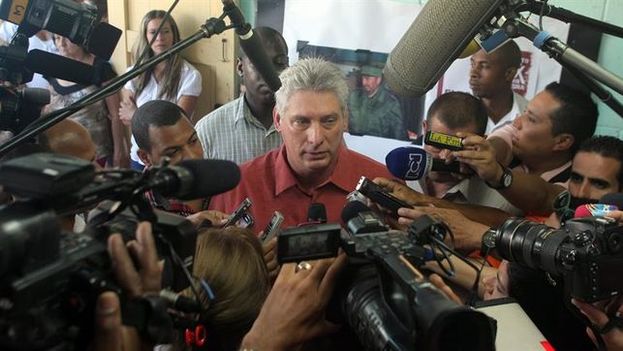
![]() 14ymedio, Yoani Sanchez, 4 August 2017 – Each ruler leaves his imprint. More than a decade ago Fidel Castro relinquished power and his brother promised continuity; but he dismantled the boarding high schools in the countryside, the army of social workers and the open anti-imperialist rallies. This coming February, Miguel Diaz-Canel could assume the presidency of Cuba and those who believe he will follow the script to the letter underestimate the vicissitudes of politics.
14ymedio, Yoani Sanchez, 4 August 2017 – Each ruler leaves his imprint. More than a decade ago Fidel Castro relinquished power and his brother promised continuity; but he dismantled the boarding high schools in the countryside, the army of social workers and the open anti-imperialist rallies. This coming February, Miguel Diaz-Canel could assume the presidency of Cuba and those who believe he will follow the script to the letter underestimate the vicissitudes of politics.
In recent days the news about the Venezuelan crisis has failed to overwhelm the political impact of what is happening in Ecuador. The country, which until recently was led by a man of arrogant discourse and aggressions against the press and his opponents, now has a more sedate president who is – at top speed – marking distances with his predecessor.
Lenin Moreno came to power wrapped in the controversy over a distortion of the vote in his favor. Last June, during a conference in Madrid, his main electoral opponent, Guillermo Lasso, defined that victory without circumspection: “In February there was the most brazen fraud that has been seen in Ecuador,” he said. The doubts about the cleanness of the elections and the closeness of the official candidate to Rafael Correa augured nothing good.
Nevertheless, a few months after assuming the highest position of the state, Moreno seems ready to chart his own course. He has huge motives to separate from Correa because the scandal of the Brazilian construction company Odebrecht is stepping on the heels of the previous administration and the country has a debt of more than 24 billion dollars. A figure that the outgoing president tried to hide before leaving, but that has finally been revealed by the current executive.
Moreno has come to converse with several opponents, including the former president Abdalá Bucaram (1996-1997) exiled for years in Panama. This is a step that shows a clear change of direction for the Palace of Carondelet, which until recently fought those who disagreed politically with blows, insults and threats.
This week, the difference between the two most recent presidents went one step further and Moreno revoked the powers of the vice president Jorge Glas, a kind of tutor left by Correa to watch over the course of the so-called Citizen Revolution. The schism threatens to fracture the Alianza País party, shaken between those who support the former president and those who clamor for the decisions of the current president to be respected.
From distant Belgium, Correa burns with anger at what he considers a betrayal. His impetuous character, fed even more by ten years in power, has led him to write numerous critical messages against Moreno on the social network Twitter. His successor has become an antagonist and has refused to follow the path laid out by the 54-year-old economist for his party colleague.
In these months Moreno, as will happen to Diaz-Canel, has had to face his people and the international community. He has realized that it is one thing to be the designated heir, while something quite different to take the helm in the control room of a country that has long been ruled by the whims of one man. To lead with some efficiency, in both cases, requires breaking with those who placed them in those positions.
The differences between the Ecuadorian and Cuban cases are marked. While the government of Rafael Correa lasted a decade, on the island the Castro brothers have controlled every detail of the economy and politics for more than half a century. The imprint left by the Correa’s time in power in Ecuador is intense and is evidenced in a greater polarization along with a weakening of civil society, but the effect of Castroism is much deeper.
Moreno has managed to distance himself from his predecessor because, among other reasons, there are democratic structures in the country that support him in this effort, something far from the Cuban landscape. In spite of the international questions about his election to the presidency, the Ecuadorian has the approval of the majority of the governments of the region and of international bodies, some of whom see him as a concerned administrator trying to impose order on the asylum.
Miguel Diaz-Canel, less charismatic and grayer, will have biology in his favor. While it can not be ruled out that Rafael Correa will put an end to his Belgian retreat and try to reassume the Ecuadorian presidency, the current Cuban vice president will witness the deaths the members of the historic generation, people who now consider him a manageable upstart, with no battles or dead to show in his favor.
However, the economic gulf that the island dauphin will inherit will be even more unfathomable. The country that he will receive in February is experiencing a process of economic stagnation, has failed to resolve the dual currency system, is experiencing a slowdown in the expansion of the private sector and has not even been able to convince a significant number of foreign investors to put their money in the Island.
Sitting in the presidential chair and with the script of each step written on the table, Miguel Díaz-Canel will face the dilemma of having to make his own decisions. With the stares of commanders and generals fixed on the back of his neck, he is likely to opt for submission. But something of his imprint, his personality, will creep into the agenda. One day, out of bravery or fear, he will end up giving some mortal blows to Castroism.
